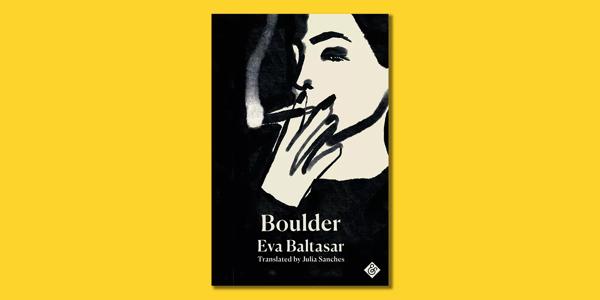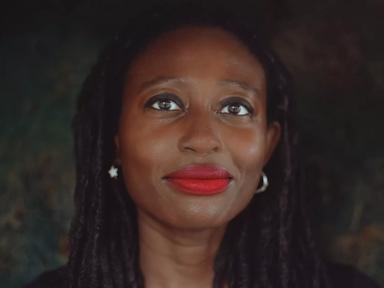See who’s on the 2023 International Booker Prize shortlist

A whopping 134 books were submitted, only six remain. The shortlist for the International Booker Prize 2023 has been announced, and here’s a first look at the books, authors and translators in the running.
Let’s not keep you waiting with pointless preamble, the six books chosen by the judges to comprise this year’s shortlist are Boulder by Eva Baltasar, Whale by Cheon Myeong-kwan, The Gospel According to the New World by Maryse Condé, Standing Heavy by GauZ’, Time Shelter by Georgi Gospodinov, and Still Born by Guadalupe Steel.
If you’re unfamiliar with the International Booker Prize, it’s an annual award given to a single book (novel or short-story collection) which has been translated into English and published in the UK and Ireland. To be considered for this year’s award the works needed to have been published in the UK and Ireland between 1 May 2022 and 30 April 2023.
Trimming 134 high quality submissions down to a final half dozen is no mean feat, so credit is certainly due to the judging panel. This year’s panel is chaired by the prize-winning French-Moroccan novelist Leila Slimani (pictured above). She is joined on the panel by Uilleam Blacker, one of Britain’s leading literary translators from Ukrainian; the Malaysian novelist and author of the 2012 Booker Prize shortlisted The Garden of Evening Mists; Parul Sehgal, staff writer and critic at the New Yorker; and Frederick Studemann, Literary Editor of The Financial Times.
The winner of 2023’s award, Georgi Gospodinov and Angela Rodel with Time Shelter, was crowned on 23 May, at a ceremony at London’s Sky Garden. But before the announcement, we welcomed all six shortlisted authors and translators for a special International Booker Prize Readings event, chaired by author, editor and academic Merve Emre. Here’s a little more about each of the shortlisted works, their authors and translators.
Boulder
written by Eva Baltasar; translated by Julia Sanches; published by And Other Stories

The ‘Boulder’ of this book’s title is the nickname afforded to a cook on a merchant ship by Samsa, a woman who the cook comes to know and love. When, as a couple, they decide to move to Reykjavik together, Samsa announces she wants to have a child. She is already 40 and can’t bear to let the opportunity pass her by. Boulder is less enthused but doesn’t know how to say no – and so finds herself on a journey that feels as thankless as it is alien. With motherhood changing Samsa into a stranger, Boulder must decide where her priorities lie, and whether her yearning for freedom will trump her yearning for love.
‘Baltasar, by way of Sanches’ translation, conjures a version of motherhood that shies away from the word. Instead, it’s an approximation, asking us to lean away from learned language, from the exact.’

Eva Baltasar
Born in Barcelona, Eva Baltasar is an author and multi-award winning poet who has published ten volumes of poetry. Their debut novel, Permafrost – published in 2018 – received the Premi Libreter from Catalan booksellers and was shortlisted for France’s Prix Médicis for Best Foreign Book. Initially published in 2020, Boulder is the second novel, from an author who likes to live a simple life, with their wife and two daughters in a village near the mountains.

Julia Sanches
Born in São Paulo, Brazil, and now based in Providence, USA, Julia Sanches is a translator of works from Portuguese, Spanish, and Catalan. A founding member of the Cedilla & Co translators’ collective, Sanches won a PEN/Heim award for her 2018 translation of Claudia Hernández’s Slash and Burn. Among the many authors she has worked with are Susana Moreira Marques, Noemi Jaffe, Daniel Galera, Geovani Martins, and Baltasar, for whom Sanches also provided the translation of their previous novel Permafrost.
Whale
written by Cheon Myeong-kwan; translated by Chi-Young Kim; published by Europa Editions

One of the most loved novels in South Korea, where it has become considered a modern classic, Whale was first published 20 years ago. Set in a remote village, the book is an adventure-satire which sheds light on the changes South Korea experienced during a rapid transition from pre-modern to post-modern society. Whale follows the lives of three connected characters; Geumbok, an ambitious woman who has been chasing an indescribable thrill ever since she first saw a whale crest in the ocean; her mute daughter, Chunhui, who communicates with elephants; and a one-eyed woman who controls honeybees with a whistle.
‘Told in an omniscient and playful narrative voice, smoothly translated by Chi-Young, this is a distinctly Korean take on Great Expectations, a tale of aspiration and folly punctuated with artisanal bricks and dried fish.’

Cheon Myeong-kwan
South Korea’s multi-talented Cheon Myeong-kwan is a screenwriter, film director and novelist whose work has been translated into eight languages. No stranger to literary awards, his first story, 2003’s Frank and I received the prestigious Munhakdongne New Writer Award, whilst Whale, which is his debut novel, first published in South Korea in 2004, won the 10th Munhakdongne Novel Award.

Chi-Young Kim
Born in Boston, USA, Chi-Young Kim initially took up translation as a hobby, having trained as a lawyer and worked as an editor. It has proved a good move as her literary translating work has seen her receive the Man Asian Literary Prize for her work on Kyung-sook Shin’s Please Look After Mum. Now based in Los Angeles, Chi-Young has also translated books by Ae-ran Kim, You-jeong Jeong, Young-ha Kim, and of course, Cheon Myeong-kwan.
The Gospel According to the New World
written by Maryse Condé; translated by Richard Philcox; published by World Editions

Baby Pascal is strikingly beautiful. Brown in complexion with grey-green eyes like the sea, but where does he come from? No-one is quite sure, and so the rumours circulate that he is the child of God. Author Maryse Condé follows Pascal’s journey, through signs and experiences that cause the theory of his creation to gain ground, as he searches to discover his origins and understand the meaning of his mission. As well as discovering himself, will he also be able to change the fate of humanity?
‘The book borrows from the tradition of magical realism and draws us into a world full of colour and life. This is a book that succeeds in mixing humour with poetry, and depth with lightness.’

Maryse Condé
At 89, Maryse Condé is the oldest person to ever appear on the International Booker Prize shortlist. Born in Guadeloupe as the youngest of eight siblings, she has been described by the Prize judges as ‘the great voice of the Caribbean’. This is her second time nominated for the Prize, having previously been considered in 2015. Condé taught Francophone Literature at Columbia University in New York, where she lived for many years, and she he has also lived in various West African countries, most notably in Mali. Among the many literary awards she has received are the African Literature Prize for her worldwide bestseller Segu, the New Academy Prize in Literature, the Cino Del Duca World Award, and a Grand Cross National Order of Merit, awarded by French President Emmanuel Macron in 2020.

Richard Philcox
As well as being a regular translator of Condé’s works, Richard Philcox is also Condé’s husband, making this the first husband-and-wife team ever shortlisted for the prize. His involvement in The Gospel According to the New World extends beyond its translation; as Condé has a degenerative neurological disorder that makes it difficult to see, she dictated this book to Philcox, who then translated it into English. Beyond his award-winning translations of Condé’s titles, Philcox has published new translations of Frantz Fanon’s The Wretched of the Earth and Black Skin, White Masks, and has taught translation on various American college campuses.
Standing Heavy
written by GauZ'; translated by Frank Wynne; published by MacLehose Press

Amidst the political bickering of the inhabitants of the Residence for Students from Ivory Coast and the ever-changing landscape of French immigration policy, two generations of Ivoirians attempt to make their way as undocumented workers, taking shifts as security guards at a flour mill. Drawing on author GauZ’ own experiences this sharply satirical novel deconstructs colonial legacies and capitalist consumption through a unique insight into all that falls under a security guard’s gaze.
‘Gauz’ has a keen eye for detail and, whilst there are sombre moments recalling a brutal past, this compact, humane satire, deftly translated by Frank Wynne, entertains as much as it informs.’

GauZ'
Author, journalist, photographer and editor-in-chief of the satirical Ivorian economic newspaper News & Co, GauZ’ route into literature wasn’t a straight-forward one. After studying biochemistry in Ivory Coast, he moved to Paris as an undocumented student, and worked as a security guard before returning to Africa. Initially published in 2014, Standing Heavy is GauZ’ first novel, winning the Prix des libraires Gibert Joseph, and has since been followed by the 2019 Prix Éthiophile, and Black Manoo winning Comrade Papa.

Frank Wynne
Ireland’s Frank Wynne will be familiar to International Booker Prize aficionados as he was the Chair of the Judges for last year’s prize, and was also previously on the shortlist in 2018 for his translation of Virginie Despentes’ Vernon Subutex One. As well as Despentes, his work as a translator from French and Spanish has seen him work with Michel Houellebecq, Patrick Modiano, Emiliano Monge, and Alice Zeniter. Among the many awards Wynne has won for his translation are the IMPAC Dublin Literary Award for Atomised by Michel Houellebecq, and the Independent Foreign Fiction Prize for Frédéric Beigbeder’s Windows on the World.
Time Shelter
written by Georgi Gospodinov; translated by Angela Rodel; published by Weidenfeld & Nicolson

In Georgi Gospodinov’s Intricately crafted Time Shelter the unnamed narrator is tasked with collecting artefacts and elements of decades gone by – from physical objects to scents – for a ‘clinic for the past’. The clinic offers a treatment for sufferers of Alzheimer’s with each floor reproducing a past decade in minute detail. But as the rooms become more convincing, an increasing number of healthy people seek out the clinic as a ‘time shelter’, hoping to escape the horrors of modern life - a development that results in an unexpected conundrum.
‘Georgi Gospodinov sees a world where time future contains, and actually becomes, time past via the recreation of locations — first clinics, then entire societies — where individuals can go to recapture earlier eras of their lives.’

Georgi Gospodinov
Having initially begun as a poet in the 1990s, Georgi Gospodinov has since become the most translated contemporary Bulgarian writer, with his works to be found in 25 languages. He’s no stranger to a shortlist either, with his novels having been previously shortlisted for more than a dozen international prizes including the PEN Literary Award for Translation, the Premio Gregor von Rezzori, the Bruecke Berlin Preis, and the Haus der Kulturen der Welt Literaturpreis. He is also a previous winner of the Jan Michalski Prize for Literature, the Angelus Literature Central Europe Prize and the Premio Strega Europe.

Angela Rodel
Hailing from Milwaukee, USA, Angela Rodel is a musician and literary translator who now lives and works in Bulgaria. Holding degrees from Yale and UCLA, Rodel has received a NEA translation grant as well as a PEN Translation Fund Grant. The former of those was for her previous collaboration with Georgi Gospodinov, translating his novel The Physics of Sorrow, which won the 2016 AATSEEL Prize for Literary Translation, and the National Book Center’s Peroto Prize for best translation from Bulgarian.
Still Born
written by Guadalupe Nettel; translated by Rosalind Harvey; published by Fitzcarraldo Editions

Guadalupe Nettel’s sensitive and surgically precise fourth novel explores one of life’s most consequential decisions, with Alina and Laura. Both are independent and career-driven women in their mid-thirties, neither of whom have built their future around the prospect of a family. Laura has taken the drastic decision to be sterilised, but as time goes by Alina becomes drawn to the idea of becoming a mother. When complications arise in Alina’s pregnancy and Laura becomes attached to her neighbour’s son, both women are forced to reckon with the complexity of their emotions.
‘Still Born is a novel that reckons with the many complications of motherhood with extraordinary grace. In limpid prose, Guadalupe Nettel… offers various epiphanies about becoming a parent.’

Guadalupe Nettel
Born in Mexico City, Guadalupe Nettel grew up between her home country and France. Still Born is her fourth novel, following on from her 2006 debut The Guest, 2011’s The Body Where I Was Born, and the 2014 Herralde Novel Prize winner After the Winter. Nettel has also written three collections of short stories and her work has been translated into more than 15 languages, appearing in publications such as Granta, El País, and The New York Times. She currently lives in Mexico City and is the director of the magazine Revista de la Universidad de México.

Rosalind Harvey
Born in Bristol and now based in Coventry, Rosalind Harvey is a 2018 Fellow of the Royal Society of Literature, a 2016 Arts Foundation Fellow. Harvey’s translation work focuses on contemporary Latin American and Spanish writing and has included writers such as Elvira Navarro, Alberto Barrera Tyszka, Enrique Vila-Matas, and the Guardian First Book Award shortlisted Juan Pablo Villalobos. This is her second time translating work for Nettel, having previously worked on her Herralde Prize-winning After the Winter.

The venue for London Literature Festival and Poetry International, Southbank Centre is the home of literature and spoken word events in the UK.